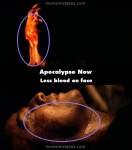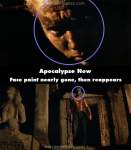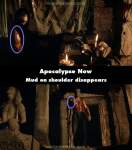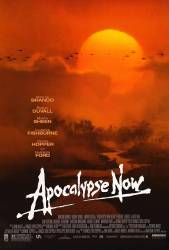Continuity mistake: There's a perfect backlit shot of Captain Willard as he swings at Colonel Kurtz and he's now wielding a third machete as he kills him. This one has a square hatchet like blade attached to a long handle. (03:07:45)

Continuity mistake: Just before Colonel Kurtz falls to the ground we catch a glimpse of him with blood running from the top of his head down the right side of his face. Several seconds later as the lies on the ground dying there are only a few small drops of blood on the right side of his face. (03:08:05)

Continuity mistake: The paint on Captain Willard's face changes many times throughout the movie. Two very noticeable examples are right after he kills the colonel, where the paint is almost entirely off his face, and several shots later as he leaves the temple heading back to the boat where his entire face is painted a much darker green then before. (03:09:20 - 03:11:50)
Continuity mistake: Captain Willard walks over to Colonel Kurtz' typewriter and sees his manuscript laying there. As he first looks down at the manuscript it's totally in the dark but in the next shot as he thumbs through it it's in the light. (03:10:55 - 03:13:20)

Continuity mistake: Captain Willard sits down at Colonel Kurtz' typewriter after he reads the manuscript and as he moves into the light we see that his right shoulder is covered with mud. To shots later as he emerges from the temple the mud is not there. (03:11:05)
Revealing mistake: As Captain Willard stands on the steps of the temple there's a wide shot of the natives. If you watch closely you'll see the movie jump. (03:12:30)
Continuity mistake: After Captain Willard emerges from the room from killing Colonel Kurtz, he has a great deal of blood and oil on his chest and shoulders. When he grabs Lance to go back to the PBR he has mud and water droplets on his chest. (03:13:20)
Continuity mistake: As the PBR backs out of Kurtz' compound the person at the controls is wearing a shirt. Lance is sitting on the front of the boat so the only other person that could be at the helm is Captain Willard who is not wearing a shirt in the previous or next shots. (03:14:00)
Revealing mistake: When Marlon Brando throws Chef's head to Martin Sheen, you can see Chef's head breathing in the close up shots.
Factual error: There are two factual errors in the helicopter attack scene - for the time frame of the war. First, the helicopters carrying troops would not have been armed with rockets or miniguns, these helicopters were called "slicks" and would only had door mounted machine guns. The helicopters armed with the rockets and miniguns were "gunships" and would not have been carrying troops. Second, a Huey is shown carrying in the Navy river patrol boat (PBR) slung beneath it. At over 16,000 lbs., a PBR weighs over four times more than a Huey of this era could have lifted. (Regardless of the REASON why these mistakes occur in the film, they are STILL mistakes.)
Continuity mistake: The PBR's roof canvas is damaged by fire after passing another PBR. Later, Chef and Lance repair it with palm fronds. When departing the Do Loung bridge, the roof canvas appears undamaged.
Continuity mistake: In the wide shot when Kilgore throws the megaphone in the air all the smoke canisters that throughout the scene were blowing behind him are now gone.
Continuity mistake: When Captain Willard runs into the photographer when he reaches Kutz's compound the scene keeps jumping back and fourth between the two characters as they walk around. The photographer is wearing a red headband. As the film shots keep jumping back and fourth between the two characters the headband changes from being folded flat to being rolled up across his brow.
Factual error: In his final speech to Willard, Colonel Kurtz talks of the Vietcong's "genius" for chopping off the arms of children inoculated against polio. While polio was technically available in both an oral form and an injectable form, any soldier administering the vaccine in SE Asia during the time would most certainly be administering the oral vaccine, and not giving a shot in the arm.
Factual error: In the scenes where members of the boat crew are wearing berets, they are worn incorrectly. Both Clean and Chief Phillips have their berets with the insignia over the right eye with the rest of the beret slanting over the left ear. That is the manner in which the French armed forces wear berets. The US and British forces wear them with the insignia over the LEFT eye with the rest of the beret slanting over the RIGHT ear. Ask any Ranger or British soldier.
Revealing mistake: In the celebration scene in the Buddhist Temple, a boy asks one of the characters for money. This would be fine, except he's speaking in Filipino and the film is set in Vietnam.
Other mistake: The comment about covert missions into Laos where everyone had foreign weapons and uniforms, etc., is bull. Many, many men went into Laos, fully equipped on UH-1A choppers with American gear. The recon teams were outfitted with American gear. I haven't found anyone that could accurately estimate how many, but a lot. A friend that came back from there said they had maps, radios, uniforms, sidearms, fully equipped choppers with rocket rounds, and so many spare barrels and boxes of ammo for the 60s they could barely get off the ground with 4 crew members. No foreign anything in choppers or teams going in or out for any trip. Not saying it didn't happen somewhere during the war, but it was not something that happened in Laos from dozens of combat vets I've talked to.
Character mistake: When Martin Sheen is on the boat, looking over Col. Kurtz's school papers, there is a dissertation by Kurtz on the history of the Philippines until 1905. The word Philippines is spelled "Phillipines"
Continuity mistake: After Captain Willard smashes the mirror, there is no blood on his right hand and chest. 5 seconds later, there is.
Continuity mistake: When Colonel Kilgore is telling Lance about surfing in the front of the water, the sun changes between shots.






Answer: It should be noted that "transmutation" is a word Coppola has used to describe the film making process. Https://m.youtube.com/watch?v=LFTQcwgq4CY.
Bishop73